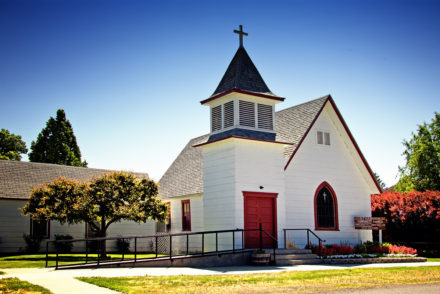This is the first installment in a five-part blog series on how to think carefully and faithfully about what the Bible teaches about the end of the world. Each of the subsequent parts of this series will be released monthly through the end of the year.
For those of us who attend Evangelical churches, especially here in the south, the apocalypse, the second coming of Jesus, and the end of the world are common topics of conversation in our churches, in our families, and in our schools. Talking about the end of the world is entirely appropriate, and Evangelicalism has a great tradition of the study of eschatology (the doctrine of the end times). To be clear, we come by this interest and focus honestly. Jesus himself talked a great deal about the end of the world, as did Paul and the other Apostles. The New Testament assumes and then expands upon the linear view of history taught in the Old Testament. History has a starting point, the Scriptures tell us, and history will have an end point as well—the fullness of the Kingdom of God.
Evangelicalism also has a bit of an embarrassing history when it comes to eschatology. Chances are you’ve seen books predicting the day and year that Jesus will return. Or you’ve seen a billboard announcing that Jesus’ return will happen this September. Or you’ve heard a preacher on TV announce that the coming of Jesus is near because of the moon phase or the politics of Europe or the invention of some new technology. So far, they’ve all turned out to be dead wrong.
It is likely that most of the people reading this blog don’t go to churches where the pastor has a long track record of predicting (or, more correctly, failing to predict) the end of the world. But it is likely that Christians regularly hear the far more common version of the prophetic refrain in Evangelicalism: “I don’t know when Jesus is coming back, but I know it will be soon!” And by “soon” they don’t simply mean that Jesus could come back at any moment (I believe that!). They don’t simply mean that we are living in the “last days” (Paul is clear; we are!). They mean they have read the signs, watched the news, and decoded the prophecies, and they are confident that Jesus’ return will happen in just a short span of time from now.
If you or your favorite preacher has said something like that, you are in pretty good company. Christians have been expressing that very sentiment for nearly 2,000 years. To this point all of them have been demonstrably wrong. Though, I suppose, eventually someone who says, “Jesus’ return will be soon!” will turn out to be correct, but I’m confident that sort of theological gambling isn’t really how we want to either read the Scripture or formulate our theology.
The Bible itself speaks very differently about our knowledge of the timing of the end of the world. From the New Testament, two things are quite clear. First, the central metaphors in the New Testament about the Second Coming all point to the fact that we do not know when it will happen. The language we find throughout the New Testament expresss concepts like being robbed by a thief or a woman suddenly going into labor. Jesus and Paul both use these metaphors to admonish us to be ready now, and at all times, specifically because we don’t know when the end times will happen.
Second, it is clear that the explicit teaching of Jesus himself, apart from any parables or metaphors, is that we do not know when the end will come. In case you are skeptical, here are a few examples:
Matthew 24
“The Son of Man is coming at an hour you do not expect.”
“But concerning that day and hour no one knows, not even the angels of heaven, nor the Son.”
Matthew 25
“Watch therefore, for you know neither the day nor the hour.”
Acts 1
“It is not for you to know times or seasons that the Father has fixed by his own authority.”
If the central metaphors in the New Testament about the end of the world indicate that we don’t know when it will happen and the teaching of Jesus himself indicate that we don’t know when it will happen, then why do Bible-believing, well-intentioned Evangelicals continue to say things like, “I don’t know when Jesus is coming back, but I know it won’t be long from now!”?
In my experience there are usually three factors at work behind Christians that claim they know when the end will happen (i.e. that it will be “soon”). First, there are some who believe the New Testament actually gives us permission to predict when the end is at least “near,” either based on a particular reading of the eschatological texts in the New Testament or based on a belief that the prohibitions in the New Testament don’t really apply to their kind of prediction. Second, they believe they have prophetic and historical facts that point to the end being near. And third, they have both a great weariness about how our world is turning out and a great longing to see Jesus.
I will deal specifically with how to read the eschatological texts in the rest of the blog posts in this series. That is a topic too lengthy to discuss here. But let me briefly deal with the belief that the prohibitions in the New Testament about knowing when the end will come don’t really apply to certain kinds of predictions.
I once asked a student of mine why he felt the liberty to claim that he knew the end was near in direct contradiction to the teaching of Jesus. His answer was both well-spoken and elaborate, but it simply boiled down to nothing more than, “Jesus said we couldn’t know the day or the hour, so I would never predict the day or the hour. But that doesn’t mean we can’t know the week or the month or the year. We can’t know the day, but we can know that it won’t be long now.”
That response, well-meaning though I’m confident it was, is an entirely unsatisfactory way of looking at the Scripture, because it doesn’t take into account the context in which Jesus’ statements were made. It is clear from the context of Matthew 24 and 25 and Acts 1 that Jesus said the words he did in order to put a stop to the disciples trying to figure out when the end was going to happen and to quench their desire to know the timing. This is most obviously Luke’s intent in Acts 1. There the disciples ask specifically about the timing of the end of the word: “Will you now restore the Kingdom to Israel?” They’ve seen some remarkable things and think they can conclude from their observations that they know the end will come soon. Jesus’ answer—“It is not for you to know times or seasons that the Father has fixed by his own authority.”—points to three things. First, the broad swath of time we call “the end times” is not for us to know. Jesus doesn’t use “day” or “hour” here. He uses “times” and “seasons.” Both words indicate a broad span and category of history. Second, knowing when the end will come is not just outside of their knowledge, but it is outside of their authority. It is above their pay grade. Jesus isn’t teasing them with a mystery so they might try to solve it. Jesus indicates this knowledge is not theirs to know, and to ask, to seek, to try to know would be direct insubordination against their Heavenly Father. And third, Jesus wants them to do something other than engage in eschatological inquiry. He wants them to engage in the mission of God around the world exactly because God is one day going to bring the world to an end and establish his kingdom on earth.
When we make theological statements, we are not merely obligated to say things that don’t contradict the Scripture. We are obligated to say what the Scripture says, and we are obligated to mean what the Scripture means. To try to find a loophole in Jesus’ prohibition about predicting the end of the world so we can go on making predictions about the “soon-ness” of the end reminds me a lot of dinner at my house last night. My 12 year-old son has the responsibility to clear the table after dinner. He wasn’t doing his job, so I had to remind him. “Son,” I said, “don’t forget the dishes.” I came back a few minutes later to find that the silverware and the used napkins were still on the table. His response when I called him back into the kitchen to finish his job was, “You said not to forget the dishes. Napkins aren’t dishes.” My son knew what his job was, and he knew what I meant when I said, “Don’t forget the dishes.” He tip-toed around my words, because he didn’t want to do what he was told. When it comes to how Jesus talks about the end of the world, we know our job. We know what Jesus meant, and we must not tip-toe around Jesus’ words because we simply don’t want to do what we were told.
As I said above, I believe that Jesus is coming again. I believe that we must, at every moment, live in anticipation of Christ’s coming because we don’t know when it will be. When and how the end will come is in the faithful hands of our Heavenly Father, and he is trustworthy. And with those who are wearied by the current state of our world and who are longing for Jesus’ soon return I say, “Amen. Come quickly, Jesus.”





